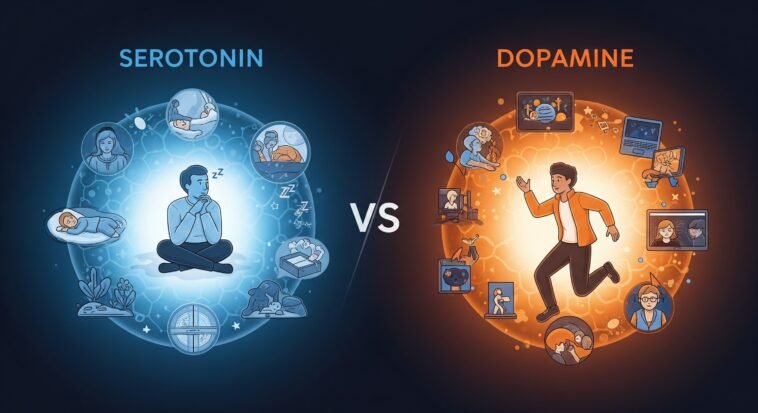
Your brain runs on a bunch of chemicals, but two matter most for how you feel and function: serotonin and dopamine.
Serotonin keeps your mood steady and helps you stay calm.
Dopamine pushes you to chase goals and feel rewarded.
They work differently, but together, they shape everything from your sleep and focus to motivation and mental health.
Knowing how they work—and how to keep them balanced—can make a real difference in how you feel day to day.
What Is Serotonin and How Does It Work?
Serotonin (also called 5-HT) is a chemical messenger your body makes—and here’s the wild part: about 90% of it is made in your gut, not your brain.
Yep, your digestive system is actually your serotonin HQ.
The rest—about 10%—is made in your brain, where it helps keep a bunch of important stuff in check like your mood, sleep, hunger, and even how you connect with people.
Key functions of serotonin
Mood regulation:
Think of serotonin as your brain’s emotional cushion.
When your serotonin levels are solid, you feel calm, stable, and generally okay with life.
But when levels dip too low, that’s when things like anxiety, irritability, and depression can sneak in.
Sleep quality
Serotonin helps your body know when it’s time to wind down.
Your brain turns it into melatonin (the sleep hormone) when it gets dark, which helps you fall asleep and stay asleep.
Appetite control
It also has a say in your hunger signals.
Serotonin tells your brain, “Hey, we’re full now,” so you don’t overeat.
If your levels are off, it can mess with your eating—making you want to eat too much or not at all.
Social behavior
Believe it or not, serotonin affects how you show up in relationships.
It helps with empathy, trust, and that feeling of being connected to people.
When it’s low, you might feel distant or irritable.
Digestive health
Since most of it lives in your gut, serotonin also plays a big role in digestion—things like moving food through your intestines and keeping your bowel movements regular.

Understanding Dopamine: Your Brain’s Reward System
Dopamine is one of your brain’s “go-getter” chemicals.
It’s made in a few key spots, like the substantia nigra and ventral tegmental area (fancy names, but don’t worry about them too much).
While serotonin keeps your mood steady, dopamine is all about energy, motivation, and that “yes, let’s do this” feeling.
Primary Functions of Dopamine
Motivation and drive
Dopamine is the reason you get up and chase stuff—whether it’s a new job, a workout, or even just a slice of pizza.
It spikes when you expect something good, pushing you to act.
No dopamine? No drive.
Pleasure and reward
It’s the “feels good, do it again” chemical.
Every time you do something enjoyable—laugh with a friend, crush a goal, eat chocolate—dopamine shows up and says, “Let’s remember this.”
It wires your brain to want more of whatever just happened.
Focus and attention
Dopamine helps you stay locked in, especially when you know there’s a reward at the end.
It’s like your brain’s internal cheerleader keeping you focused until the job’s done.
Motor control
Here’s a big one: dopamine helps control movement.
If your brain doesn’t make enough of it (like in Parkinson’s disease), simple things like walking or holding a pen can get tough.
Learning and memory
Dopamine also helps you learn through trial and error.
It tags experiences with “this was good” or “don’t do that again,” which shapes how you remember things and make choices in the future.
Serotonin vs. Dopamine: The Key Differences
Understanding the distinct roles of these neurotransmitters helps explain why you might feel different types of mental and emotional challenges:
| Category | Serotonin | Dopamine |
| Emotional Impact | Creates calm, contentment, and emotional stability. |
Fuels excitement, anticipation, and motivation.
|
| Mood Style | Steady and peaceful. |
Energized and driven.
|
| Timing & Duration | Long-lasting effects throughout the day. |
Short bursts that spike with reward or anticipation.
|
| Behavioral Influence | Encourages patience, social bonding, and self-control. |
Promotes action, risk-taking, and goal-chasing.
|
| Real-Life Example | Feeling peaceful on a nature walk. |
That rush you get when you’re about to open a surprise gift.
|
| Main Function | Maintains emotional balance and mood stability. |
Drives motivation, pleasure, and learning from rewards.
|

Signs of Imbalanced Neurotransmitters
Sometimes your mood, energy, or focus feel off—but you’re not sure why.
It might have something to do with your neurotransmitters, especially serotonin and dopamine.
Here’s how to spot when either one might be out of balance:
Low serotonin symptoms
When your serotonin’s low, life can feel heavy—even if things seem “fine” on the outside:
- You feel sad or down more often than not
- Anxiety creeps in, sometimes turning into panic
- Sleep? Either you can’t fall asleep or keep waking up
- You’re craving carbs (hello, cookies and chips)
- Hanging out with people feels exhausting or just “meh”
- You beat yourself up mentally or spiral into negative thoughts
- Your stomach acts up—bloating, nausea, IBS-type stuff
Low dopamine symptoms
Low dopamine feels like your internal battery is drained—even when you’re “rested”:
- Zero motivation to start anything, even stuff you usually like
- You can’t focus—your brain just won’t settle on one thing
- Everything feels kinda… blah
- You start stuff, but never seem to finish
- You’re tired all the time, even after a full night’s sleep
- You find yourself reaching for coffee or sugar just to feel something
High dopamine symptoms
Too much dopamine? That’s a whole different vibe—think overstimulation on overdrive:
- You feel wired and restless, like your brain’s in overdrive
- You take more risks than usual or make impulsive choices
- Your thoughts race, especially at night (good luck sleeping)
- You get hooked on things fast—social media, gambling, substances
- You swing into super high moods that feel a little too intense
- Sometimes you get paranoid, edgy, or quick to anger
Balancing Both Neurotransmitters for Optimal Mental Health
Here’s the thing: mental wellness isn’t about picking serotonin or dopamine.
You need both working together—and in balance—to feel your best.
Here’s how to support them in your daily life:
Start your day right
Get some sunlight first thing—it’s a natural serotonin booster.
Then get moving, even if it’s just a quick walk or some stretching, because exercise fires up both serotonin and dopamine.
Set small goals you can actually crush—this gives your dopamine a little “win” boost to keep you motivated.
Mix work and chill
During the day, switch between focused tasks that give you dopamine hits and chill moments that help your serotonin settle in.
So, work hard, then take breaks to breathe, relax, or listen to calming music.
Eat brain-friendly foods
Load up on whole foods—lean proteins, veggies, healthy fats, and complex carbs.
These give your brain the raw materials it needs to make both serotonin and dopamine.
Plus, they keep your energy steady, no crashes.
Manage stress like a pro
Stress sucks the life out of both chemicals.
Find simple ways to chill: deep breathing, yoga, or even just stretching at your desk can help lower stress and keep those brain chemicals balanced.
Stay connected
Meaningful time with friends or family isn’t just good for your soul—it actually helps serotonin through social bonding and dopamine through shared fun and achievements.
So, call up someone you care about or plan a hangout.
When to Seek Professional Help
Look, there’s a lot you can do on your own to support your mental health—but sometimes, it’s bigger than just habits and hacks.
If you’ve been feeling stuck or overwhelmed for a while, it might be time to talk to a professional.
Here are some signs it’s worth reaching out:
- You’ve been feeling anxious or down for more than two weeks, and it’s not going away
- You’re having thoughts of hurting yourself or just want to disappear
- It’s hard to get through your normal day—like work, school, or even getting out of bed
- You’re using alcohol, substances, or other habits to numb out or cope
- Your moods swing hard, and you can’t seem to stay emotionally steady
Mental health pros are trained to help you figure out what’s going on and build a plan that works for you.
That might mean therapy, medication, or something else—but the goal is to get your brain chemicals back in balance so you can start feeling like yourself again.

Conclusion: Your Path to Neurotransmitter Harmony
Serotonin keeps you steady. Dopamine keeps you moving.
You need both working together to feel good and function well.
The best way to support them?
Keep it simple: eat real food, move your body, sleep well, manage stress, and stay connected with people who matter.
None of this needs to be perfect—just consistent.
Start small. Pick one or two habits that feel doable and build from there.
This stuff adds up. Your brain will thank you—and so will your future self.



